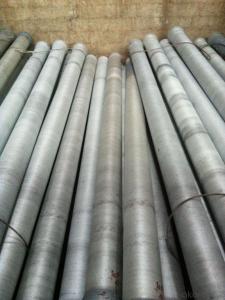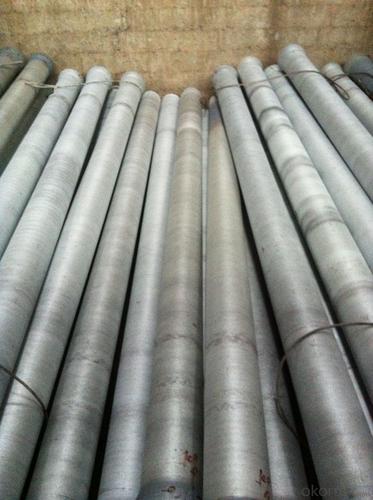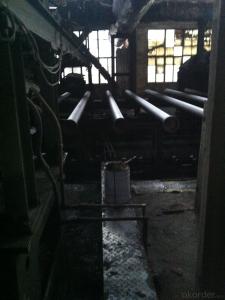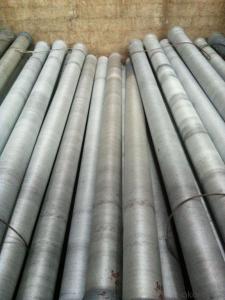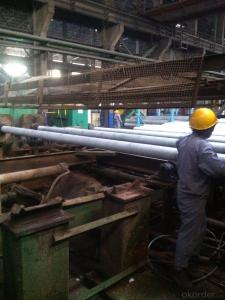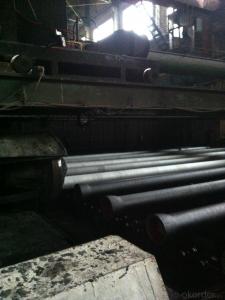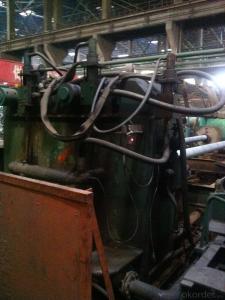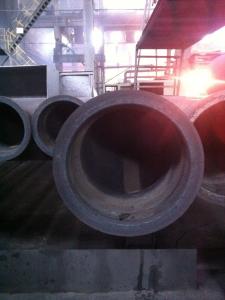DUCTILE IRON PIPE AND PIPE FITTINGS K9 CLASS DN500
- Loading Port:
- Tianjin
- Payment Terms:
- TT OR LC
- Min Order Qty:
- 32 pc
- Supply Capability:
- 3000 pc/month
OKorder Service Pledge
OKorder Financial Service
You Might Also Like
Material : Ductile Cast Iron
Size Range : DN 80mm to DN 2000mm
Unit Effective Length : 6m or 5.7m
Manufacture Standard: ISO 2531:1998/ EN 545:2006/EN 598:2007
Annual capacity : 200,000 tons
Coating Exterior: Zinc 130g/m2 according to ISO 8179-1 and bitumen coating 70 microns.
Cement Interior: Portland Cement/ High Alumina Cement/ Sulphate Resisting Cement Lining according to ISO 4179
Special requirements on external coating and internal lining can be applied
We also provide accessories such as SBR/EPDM rubber gaskets, lubricant paste, pipe caps, PE sleeves, etc.
Additional Parts:
Each pipe is strictly inspected according to related standard to ensure permanently high performance.
Easy Installation at site and service free for life
Long Service Lifespan
Quotation will arrive you within 24hours once we get your inquiry.
We guarantee offering you a competitive price.
A copy of original inspection reports of pipes will be offered after shipment.
Photos of loading process will be sent to the customer after shipment effect.
We will follow-up the delivery progress after shipment effect and update to the customer on weekly basis.
- Q: Ductile cast iron can replace copper sleeve
- Although the ductile cast iron with lubrication, but no lubrication or copper sleeve, Rongchang graphite copper sleeve, with self lubrication with high strength copper alloy (CuZn25Al5, CuZn24Al6Fe3Mn4) as the basic material, according to the use conditions according to a certain proportion in the work surface processing hole and fill in the solid lubricant, high strength copper alloy provide a high bearing capacity and solid lubricant can form low friction.
- Q: What is the lifespan of ductile iron pipe?
- The lifespan of ductile iron pipe can vary depending on several factors such as the quality of the pipe, installation conditions, and maintenance practices. On average, ductile iron pipe can last for 50 to 100 years or more, making it a durable and long-lasting option for water and wastewater infrastructure.
- Q: Are ductile iron pipes suitable for use in desalination plants?
- Ductile iron pipes are indeed suitable for use in desalination plants. Desalination plants are facilities that remove salt and other impurities from seawater, turning it into fresh water for consumption or industrial use. These plants require a reliable and durable piping system to transport the treated water to various destinations. Ductile iron pipes are known for their strength, flexibility, and corrosion resistance, making them an ideal choice for desalination plants. These pipes are made from a form of cast iron that has been treated with magnesium to enhance its properties. This treatment gives ductile iron pipes a high tensile strength, allowing them to withstand the high pressures associated with the desalination process. Additionally, desalination plants often use chemicals and other treatment methods to remove impurities from the water. Ductile iron pipes have excellent resistance to corrosion from these chemicals and can withstand the harsh conditions found in desalination plants without deteriorating over time. This ensures the longevity and reliability of the piping system, minimizing the risk of leaks or failures. Furthermore, ductile iron pipes have a smooth internal surface, which helps to minimize friction and pressure loss as water flows through the pipes. This feature is especially important in desalination plants, where efficiency is crucial for the overall operation of the facility. The smoothness of ductile iron pipes allows for efficient water flow, reducing energy consumption and optimizing the desalination process. In conclusion, ductile iron pipes are suitable for use in desalination plants due to their strength, flexibility, corrosion resistance, and smooth internal surface. These pipes provide a reliable and durable piping system that can withstand the high pressures, harsh chemicals, and demanding conditions found in desalination plants.
- Q: What are the disadvantages of using ductile iron pipe?
- Some of the disadvantages of using ductile iron pipe include its relatively high cost compared to other materials, its susceptibility to corrosion over time, and its heavy weight which can make installation more challenging. Additionally, ductile iron pipe may require more maintenance and repairs due to potential cracking or leaking.
- Q: Luo what effect of ductile cast iron
- Chromium can improve the hardness, strength and wear resistance of nodular iron, and increase bainite in bainite ductile iron.
- Q: How much is the working pressure of ductile iron pipe used in water supply pipe and how is MPa determined?
- Upstairs are positive solutions, but now outdoor buried water pipes are using steel wire mesh skeleton, plastic composite pipe instead of ductile iron pipeThe general pressure grades used for water supply pipes are 1.0MPa and 1.6Mpa
- Q: How do ductile iron pipes perform in earthquake-induced ground movements?
- Ductile iron pipes perform well in earthquake-induced ground movements due to their inherent strength and flexibility. The material's ductility allows it to withstand ground shaking, ground settlement, and other dynamic forces during an earthquake. This flexibility helps prevent the pipes from fracturing or bursting, minimizing the risk of water or sewage leaks. Additionally, ductile iron pipes are designed to accommodate ground movements by using joints that can expand and contract, ensuring their stability and preventing damage.
- Q: Are ductile iron pipes suitable for use in sewage pumping stations?
- Yes, ductile iron pipes are suitable for use in sewage pumping stations. Ductile iron pipes are known for their durability, strength, and excellent corrosion resistance, making them an ideal choice for wastewater applications. They can withstand the high pressures and abrasive characteristics of sewage systems without any significant degradation or loss of performance over time. Additionally, ductile iron pipes have a smooth interior surface, which helps to minimize friction losses and prevent blockages. Furthermore, ductile iron pipes have a long lifespan and require minimal maintenance, reducing overall operating costs. Therefore, due to their various advantageous properties, ductile iron pipes are highly suitable for use in sewage pumping stations.
- Q: How does ductile iron pipe compare to PVC pipe in terms of strength?
- Ductile iron pipe is generally stronger than PVC pipe in terms of strength. Ductile iron has a higher tensile strength and can withstand higher pressures and heavier loads compared to PVC, making it suitable for applications that require greater durability and strength.
- Q: Which direction should the spigot of the K9 ductile iron pipe be installed?
- Ductile weakness: ductile cast iron pipes connected by human factors such as the operation level of responsibility, influence, construction not convenient. The advantages of PE PE PE pipe has good corrosion resistance and its anti inorganic performance than that of the metal pipe is much stronger in the buried without corrosion, construction convenient. Small diameter PE pipe in the price performance ratio is better than that of steel and ductile iron.PE tube have disadvantages: benzene, gasoline, carbon tetrachloride and other organic solvents have certain effect on pe. If the organic solvent is infiltrated into the polyethylene, the swelling will occur, and its physical properties will be decreased. Its pressure resistance and temperature resistance are poor.
Send your message to us
DUCTILE IRON PIPE AND PIPE FITTINGS K9 CLASS DN500
- Loading Port:
- Tianjin
- Payment Terms:
- TT OR LC
- Min Order Qty:
- 32 pc
- Supply Capability:
- 3000 pc/month
OKorder Service Pledge
OKorder Financial Service
Similar products
Hot products
Hot Searches
Related keywords
